- Home
- Fannie Flagg
The Wonder Boy of Whistle Stop
The Wonder Boy of Whistle Stop Read online
The Wonder Boy of Whistle Stop is a work of fiction. Names, characters, places, and incidents are the products of the author’s imagination or are used fictitiously. Any resemblance to actual events, locales, or persons, living or dead, is entirely coincidental.
Copyright © 2020 by Willina Lane Productions, Inc.
All rights reserved.
Published in the United States by Random House, an imprint and division of Penguin Random House LLC, New York.
RANDOM HOUSE and the HOUSE colophon are registered trademarks of Penguin Random House LLC.
Hardback ISBN 9780593133842
Ebook ISBN 9780593133859
randomhousebooks.com
Book design by Victoria Wong, adapted for ebook
Cover illustration: Ben Perini
ep_prh_5.6.0_c0_r0
Contents
Cover
Title Page
Copyright
Prologue
Sheriff Grady Kilgore
Dot Weems
Idgie Threadgoode
Buddy Jr.
Twenty-Five Years Later
Welcome to the World
U.S. Army Base
Dot Weems
The Visit
Ruthie and Brooks
Dot Weems
Different Backgrounds
At Caldwell Circle
Dot Weems
Silver Spring, Maryland
Callaway Resort and Gardens
Bud in a Nutshell
The Bee Charmer
Atlanta, Georgia
Losing Ninny
An Unexpected Turn of Events
Atlanta, Georgia
Daddy’s Girl
The Elephant in the Room
What Now?
The Weems Weekly
Briarwood Manor
Losing Daddy
Nervous in the Service
Why Isn’t He Calling?
The Escapee
Time on My Hands
Briarwood Manor
The Mix-up
Amtrak
Whistle Stop, Alabama
Aboard the Amtrak
Whistle Stop, Alabama
The Weems Weekly
Amtrak Train
A Christmas Tradition
A Year Later
Whistle Stop, Alabama
The Weems Weekly
Whistle Stop, Alabama
Amtrak Train
Going Home
All Over the News
Get Me to Birmingham
Bud in Birmingham
A Kindred Spirit
The Connection
More Than Meets the Eye
The Wonder Boy
A New Friend
The Weems Weekly
Whistle Stop, Alabama
Surprise Visitors
Going Back to Briarwood
Jessie Ray Scroggins
Safe at the Plate
Evelyn and Ruthie
Fairhope, Alabama
Opal Butts
The Birthday Wish
Dot Weems
The Proposal
A Close Call
“Who Would Believe Such Pleasure…from a Wee Ball of Fur”
The Eviction Notice
Ruthie Gets a Call
The Insurrection
The Will
Evelyn’s Call
Time Ran Out
The New Proposition
Only in America
Telling Daddy
Let the Project Begin!
23 and Who?
The Surprise
Very Bad News
Dot Weems
Dot Weems
Breaking a Heart
Back Where She Started
The End of an Era
The Dead Body
Good News
An Old Acquaintance
Ready to Begin Again
The Chicks Return
Look What the Cat Dragged In
The Grand Opening
Epilogue
Dedication
Acknowledgments
By Fannie Flagg
About the Author
L & N TERMINAL TRAIN STATION
BIRMINGHAM, ALABAMA
November 29, 1938, 8:10 A.M.
IT WAS A cool November morning. Inside the large train station, shards of clear bright sunlight shot down through the glass ceiling as arriving and departing passengers and porters with carts piled high with luggage hurried back and forth across the white marble floor in a beehive of activity. Sounds of happy chatter and trains pulling in and out of the station echoed throughout the entire building.
Over on platform 7, the Crescent, the long silver train from New Orleans, was now ready to receive its Birmingham passengers, and Mr. and Mrs. Arthur J. Hornbeck quickly climbed aboard, headed to New York City for their annual Christmas shopping trip.
Mrs. Hornbeck, carrying six large round hatboxes, three in each hand, happily banged down the aisle, hitting several sleeping passengers in the head as she passed by. Mr. Hornbeck, with his newspaper tucked under his arm, followed five steps behind.
Some twelve and half minutes later, after all the hatboxes had been stacked and her fur coat carefully hung up in the compartment closet, Mrs. Hornbeck was finally ready to settle down, relax, and enjoy the ride. She looked out the window just as they were approaching the Whistle Stop, Alabama, railroad crossing. As they got closer, she suddenly noticed a little blond boy in faded overalls standing by the tracks, smiling and waving at the train as it went by. Mrs. Hornbeck had a little boy at home about his age, so as they rode past him, she smiled and waved. When the little boy saw her, he began running under her window, waving back at her, as hard and for as long as he could. She watched him until he and the little dog running along beside him became smaller and smaller, until they were both completely out of sight.
After a long moment, Mrs. Hornbeck turned to her husband with a concerned look on her face and said, “Arthur, I think that little boy back there had an arm missing.”
Never looking up from his paper, he replied, “Well, I’ll be.”
Mrs. Hornbeck sighed, sat back in her seat, and began fingering her triple strand of pearls, then said, “Oh, what a shame. He couldn’t have been more than seven or eight at the most, and he was the cutest little thing. You should have seen him. So happy, smiling away….Well, bless his precious little heart. My cousin Charles had a little finger missing, but an entire arm? I wonder what in the world could have happened to him.”
Her husband glanced over at her. “What did you say?”
“I said, I wonder how that poor little boy lost his arm. What could have happened?”
Mr. Hornbeck, a master at stating the obvious, replied, “Well…something must have.”
* * *
—
SHE HAD SEEN the little boy for only a few seconds at the most. But every year after that, as the
ir train passed through the Whistle Stop crossing, Mrs. Hornbeck always leaned forward in her seat and looked out, hoping to see him again. And every year when he was not there, she would always turn and ask her husband, “Arthur, I wonder whatever became of that cute little blond boy with the one arm.”
“Beats me,” he always said.
WHISTLE STOP, ALABAMA
January 24, 1991
GRADY KILGORE, A big barrel-chested bear of a man in his seventies, had been the sheriff of Whistle Stop, Alabama, until 1958, when he and his wife, Gladys, had moved to Tennessee. Today, Grady had driven down to Whistle Stop from Nashville with his grandson and was standing on the railroad tracks, looking across the street to where the old Whistle Stop Cafe used to be. Kudzu vines had grown all over the buildings and had covered most of the block. It was hard for his grandson to tell what was underneath.
Grady pointed over to one of the buildings. “That’s the old post office that Dot Weems ran, and right there’s the cafe, next to Opal Butts’s beauty shop, where your grandma got her hair done up every Saturday morning.” Grady stood there looking around and was sad to see how much the place had changed since the last time he’d stopped by.
By now, the old two-lane highway from Birmingham to Whistle Stop had been bypassed by a new six-lane interstate, and most of the area was now just a dumping ground. Old rusty cars and trucks had been abandoned by the tracks, left to slowly fall apart. Empty beer cans and whiskey bottles were everywhere. And as a sad sign of the times, Grady noticed there was a lot of drug paraphernalia scattered around that hadn’t been there before.
The Baptist church, where he had heard Reverend Scroggins preach every Sunday, was now almost falling down, the stained-glass windows broken, the pews removed and sold. All that was left of the town were some of the old buildings and the old Threadgoode home, and that was barely standing. Vandals had pretty much destroyed everything else. Grady turned to his grandson and shook his head. “When I get to thinkin’ how this place used to be, and what it is now, it just makes me sick. It wasn’t never a fancy town, but it was clean. Now there’s junk scattered everywhere. And the old Threadgoode house is full of graffiti, the windows all knocked out. You’d never know to look at it now, but that house used to be the prettiest one in town. For the life of me, I still cain’t figure out why Whistle Stop went to seed like it did. I even heard the whole town was sold, and they were gonna knock it all down and build a tire factory out here.”
Grady looked across the street again and sighed. “I don’t know why they’re just lettin’ the old cafe sit and rot away like that. It just don’t seem right. That cafe used to be like going to a good friend’s house to eat. Two great gals ran it. Idgie Threadgoode and Ruth Jamison. You woulda loved ’em. Everybody in town used to eat there, all the railroad men and their families. Every Christmas Day their cook, Sipsey, and the gals would lay out a big spread, and we’d all go over and eat, open our presents, and sing carols.” Then, unexpectedly, Grady let out a little sob. He quickly turned away, pulled out a handkerchief, and blew his nose and looked apologetic.
“Sorry about that. Oh Lordy. I don’t need to go thinkin’ about the old days…but lots of good times were had in that old cafe with Ruth and Idgie. Ruth’s son, little Buddy, grew up in that cafe. Poor kid. Lost his arm when he wasn’t much older than you.” Grady then carefully folded his handkerchief and put it back into his pocket.
Then he said, “Now, you may not believe this, but a few years back on Christmas Day your grandma and me was over in Birmingham visiting Opal Butts, and while they were busy cooking up dinner, I snuck out and took a little ride out here. And I was standing right here, on this same spot we are now, when—real quiet like at first—I started to hear a piano playing and people laughing, and it was coming from over there, right where the cafe used to be. I looked around and there wasn’t nobody there, but I swear I heard it. What do you think it could have been?”
His grandson rubbed his hands together and said, “I don’t know, Granddaddy, but can we go now? I’m getting cold.”
WHISTLE STOP, ALABAMA
1935
DOT WEEMS WAS a friendly little woman who just loved to chat. When she was younger, she had hoped for a literary career on the order of her idol, Edna Ferber. But at seventeen, she had fallen in love with “the man of her dreams,” and had married Wilbur Weems instead.
Later she would often joke that even if she hadn’t become a famous novelist, she was still “a woman of letters.” Aside from single-handedly running the Whistle Stop Post Office for sixteen years, Dot also wrote and published a weekly newsletter reporting on all the town’s activities under a banner that read:
The Weems Weekly
(WHISTLE STOP, ALABAMA’S WEEKLY BULLETIN)
“No gossip, just the plain facts, folks!”
Dot had just sent out the week’s newsletter, and this morning people all over Whistle Stop were busy reading it.
The Weems Weekly
(WHISTLE STOP, ALABAMA’S WEEKLY BULLETIN)
November 30, 1935
The Turkey Thief
Hi Gang. Well, I hope you all had a happy Thanksgiving. I know for sure that Wilbur’s old hound dog, Cooter, did. Yes, that was him you saw running through town Thanksgiving Day with my freshly cooked turkey in his mouth. The one he had just snatched off the table, the minute my back was turned, trailing my stuffing all through the living room. Honestly, men and their dogs! Thank heavens my next-door neighbor, Ninny Threadgoode, took pity on us and had us over for dinner or Wilbur and I would have gone turkeyless! And not only was Ninny’s turkey delicious, we also enjoyed Sipsey’s sweet potato pie that Idgie sent over from the cafe. So as Mr. Shakespeare says, “All’s well that ends well.” Yum yum.
But now to the important news: It seems we have a rare archaeological find right here in Whistle Stop! Where? According to Idgie Threadgoode, right in our very own backyard! Well, the backyard of the cafe, that is. Idgie reports that she and little Buddy were out in the back digging up red worms to go fishing with, when she dug up (hold on to your hats, folks) a five-million-year-old dinosaur tooth! Idgie has it out on display on the counter at the cafe for all to see, so if you want to take a look, go on over.
Good news from the beauty shop: I am also happy to announce that Opal Butts says she finally got the hair dryer to working again, so if you missed last week’s hair appointment, she will be working overtime to fit you in. I know the ladies who are going to the Elks Club dinner Saturday night will be happy to hear it. Me, too.
More good news: Sheriff Grady said that other than a few minor mishaps, involving a few of our citizens and too much “Old Man Whiskey,” we have been crime free for another year. Thank you, Grady.
Your faithful scribe,
…Dot Weems…
P.S. Don’t forget to tell the kids to get their letters to Santa Claus written. Remind them that it’s a long way to the North Pole from Whistle Stop, and Santa needs plenty of time to make all those toys.
* * *
—
LATER THAT NIGHT, Wilbur Weems, a tall, thin man, was laughing when he came home for supper. As he walked in the door, he said, “Well, Dot, thanks to you, everybody in town was over at the cafe today to see that darned dinosaur tooth.”
Dot was putting a bowl of mashed potatoes down by his plate. “I know. I went over myself. Do you think it’s real?”
Wilbur sat down and took a swig of iced tea. “Knowing Idgie, I doubt it. She just loves to pull jokes. Remember that petrified two-headed frog she had in a jar last year? I found out later it was rubber.”
“No, you don’t mean it.”
“Oh yeah. She told me she bought it over in Birmingham at the magic shop.”
“Oh my,” Dot said as she sat down and passed him the cornbread. “What will that girl come up with next?”
&n
bsp; “Who knows? But whatever it is, it will be fun, you can count on that.”
WHISTLE STOP, ALABAMA
JUST LIKE EVERYBODY else in town, Dot and Wilbur Weems had known and loved Idgie Threadgoode all her life. Idgie had always been a tomboy, always tall for her age, with short, curly blond hair. From the time she could walk, she’d loved to play sports with the boys and climb trees. Most of the time, she was up in the big chinaberry tree in the front yard of the Threadgoode house or else sitting up on the roof. Her mother said she must be related to a monkey, because Idgie would and could climb anything.
When she was around six, she had been playing over at the rail yard, and that afternoon, when her mother was out sweeping the front porch, she happened to look up as the five o’clock to Atlanta was passing the Threadgoode house, and there sat Idgie on the top of the train waving at her mother as she rode by.

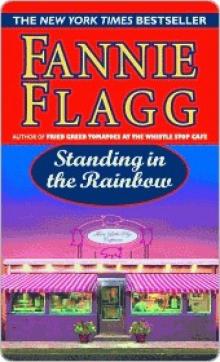 Standing in the Rainbow
Standing in the Rainbow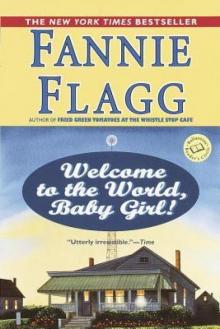 Welcome to the World, Baby Girl!
Welcome to the World, Baby Girl!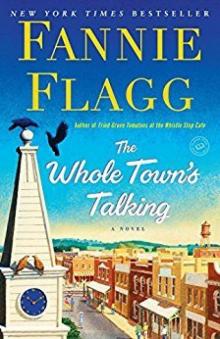 The Whole Town's Talking
The Whole Town's Talking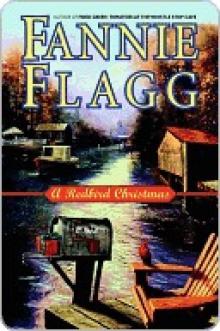 A Redbird Christmas
A Redbird Christmas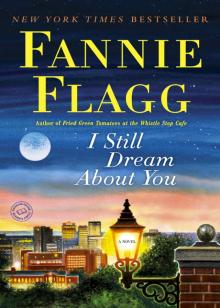 I Still Dream About You
I Still Dream About You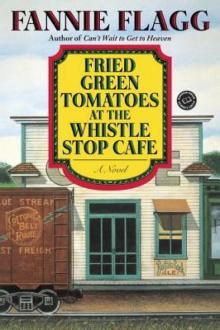 Fried Green Tomatoes at the Whistle Stop Cafe
Fried Green Tomatoes at the Whistle Stop Cafe Can't Wait to Get to Heaven
Can't Wait to Get to Heaven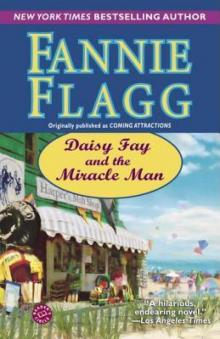 Daisy Fay and the Miracle Man
Daisy Fay and the Miracle Man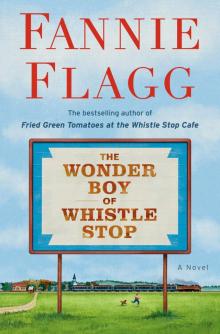 The Wonder Boy of Whistle Stop
The Wonder Boy of Whistle Stop The All-Girl Filling Station's Last Reunion
The All-Girl Filling Station's Last Reunion I Still Dream About You: A Novel
I Still Dream About You: A Novel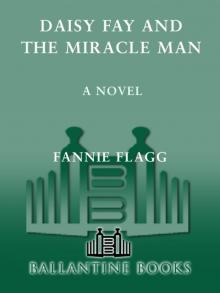 Daisy Fay and the Miracle Man: A Novel
Daisy Fay and the Miracle Man: A Novel